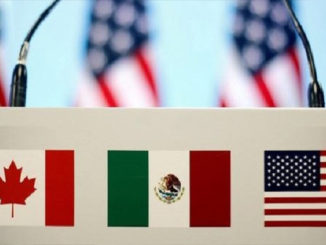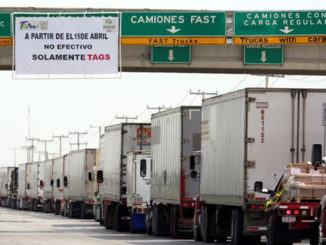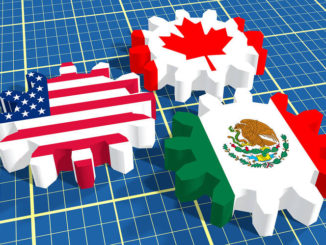
By ARGEO PAUL CELLUCCI And STEPHEN R. KELLY
If workers were allowed to move freely in North America, the ‘path to U.S. citizenship’ problem would fade away.
A bipartisan Senate proposal on immigration reform has drawn praise, including from President Obama. But a key feature of the proposal—how to handle the 11 million foreigners living in the country illegally—has provoked a familiar objection: Why grant U.S. citizenship, that most precious of rights, to those who broke the law to get here?
We believe there is a simpler, fairer and more efficient solution that won’t get bogged down in the “path to citizenship” debate. Rather, it will unlock the enormous potential of North America’s labor pool:
Take the final logical step of the North American Free Trade Agreement—and allow the citizens of the U.S., Canada and Mexico to work legally in any of the three countries, making the U.S. border as open to workers as it has been for nearly two decades to goods and investment.
In one market-based move, which President Obama could negotiate with America’s Nafta partners and submit to the Senate for ratification, the U.S. could solve a huge part of its immigration problem while breathing new life into North American trade.
When Nafta took effect in 1994, it was a precedent-setting regional trade agreement that created the largest free-trade area in the world. Merchandise trade between Canada, Mexico and the U.S. has more than tripled since 1994 and now exceeds $1 trillion annually, or more than $3 billion a day.
The U.S. sells more goods to Canada alone than to all 27 countries of the European Union combined. Nafta-facilitated foreign direct investment has also soared over this same period, with two-way U.S.-Mexican investment alone more than quadrupling from 1994-2011.
For all its benefits, however, Nafta did little to facilitate the movement of people. Apart from creating a narrow category of visas for professionals, the treaty said nothing about workers. This silence didn’t stop millions of them from following the jobs that Nafta helped create, whether they had the legal status to work or not.
Now is the ideal time to address this omission. Citizens of the U.S., Canada or Mexico should be able to work legally in any Nafta country in the same way that citizens of European Union countries can work anywhere in the EU. This mobility would allow the North America labor market to function as efficiently as the industrial, agricultural and financial markets that Nafta has created, matching workers with jobs in a seamless continental web.
Allowing markets, rather than immigration officials, to decide where people can work would likely boost economic growth by reducing labor shortages, providing greater flexibility to employers, and giving more options to unemployed workers willing to relocate.
According to the Pew Hispanic Center, some 58% of the 11 million illegal immigrants now living in the U.S. are Mexican. With permission to work here legally, they could have their status regularized overnight. They would become legal not because the U.S. grants them citizenship but because they are citizens of Mexico, a Nafta member. If they want to pursue U.S. citizenship at a later time, they will have to follow the same procedures as any other foreigner. But with this group of more than six million undocumented immigrants taken care of, finding solutions for the remaining illegal population would be far less daunting.
In communities where the newly legal Mexican workers live, the benefits would be immediate. Since they would no longer be paid off the books, they would pay more taxes. They would also qualify in many cases for health insurance, easing the current financial burden on hospital emergency rooms.
With permission to live and work legally in the U.S., they would probably choose to return home more often and perhaps even leave their families in Mexico, further easing the strain on local services. After all, before the fortification of the U.S. border with Mexico over the past decade, many Mexican workers circulated to jobs in the U.S. during harvest season and then returned to Mexico. When crossing the border became more difficult and expensive, workers tended to put down roots in the U.S. and bring their families to them.
Clearly, opening U.S. borders to Nafta workers would cause some disruptions, just as opening those borders to the free movement of goods and capital has. When the EU expanded in 2004 to include the eight former communist satellite states of Central and Eastern Europe, many existing EU members feared an avalanche of cheap labor from countries with much lower average incomes. Similar concerns exist about lower-paid Mexican laborers flooding the U.S. and Canadian labor markets.
But the EU opening didn’t prove as disruptive as some expected. There is little evidence that the movement of people from east to west drove down wages or displaced local workers after an initial adjustment period. Several studies, including a November 2008 EU report headlined “Free movement of workers is good for Europe’s economy,” suggest that both the sending and receiving countries benefited from a more rational allocation of labor.
While the EU has serious economic problems at the moment, labor mobility isn’t one of them. And if workers weren’t free to go where the jobs are, unemployment in hard-hit countries such as Spain might be even worse.
We believe the same benefit would occur in North America, and that it would necessarily be reciprocal, with many Americans finding opportunities in Canada and Mexico, especially in the energy and financial sectors. This would permit North American labor markets to adjust to fast-changing economic situations.
It also would help solve a large part of the most pressing social and humanitarian issue facing the U.S., and in a uniquely American way: by giving people already living among us the chance to work legally.
Mr. Cellucci was U.S. ambassador to Canada (2001-05) and governor of Massachusetts (1997-2001). Mr. Kelly is associate director of Canadian studies at Duke University and a former U.S. diplomat who served in Mexico City and Ottawa.
follow us on facebook and twitter



